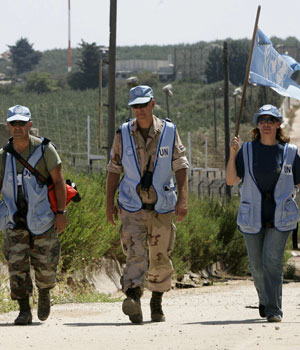
United Nations observers walk along a border near the village of Fatma Gate in southern Lebanon September 6, 2006 (REUTERS)
BEIRUT, (Reuters) – Lebanon was set to emerge on Thursday from a costly eight-week Israeli blockade of its airport and territorial waters, which German advisers and U.N. naval forces will now help the Lebanese authorities to monitor.
“The direct impact of the blockade on trade activity alone is estimated at around $45 million a day,” Finance Minister Jihad Azour told Reuters.
Ordinary Lebanese said they would be glad to see the end of Israel’s partial siege, but remained worried about the future.
“I am lost like many others,” said 25-year-old job-seeker Dania Atrouni. “I hope this means the war is over in Lebanon … but I no longer have faith that nothing (bad) will happen.”
German Foreign Minister Frank-Walter Steinmeier arrived in Beirut with four police and customs security experts who will advise Lebanese authorities at the international airport.
A German embassy spokesman said it was not yet clear how the experts, to be joined by five more flying in later, would relate to the United Nations peacekeeping force that is being expanded to uphold a shaky truce between Israel and Hezbollah guerrillas.
Israel had vowed to maintain the embargo until measures were in place to stop Hezbollah getting more arms from Syria or Iran.
It said on Wednesday it had decided to lift the blockade at 6 p.m. (1500 GMT) on Thursday, after U.S. Secretary of State Condoleezza Rice and U.N. chief Kofi Annan told Prime Minister Ehud Olmert that “international forces are ready to take over control posts over the sea ports and airports of Lebanon”. However, Lebanon has not agreed to any international monitoring at its ports or airport, although it has asked for German technical aid in securing its borders and entry points.
After Israel promised to lift the blockade, Lebanon asked Annan, who brokered the deal, to authorise German naval ships to monitor its coast. Germany has yet to receive a formal request.
Germany is to lead a multinational naval contingent. French, Italian, Greek and British naval ships are to deploy for now.
Lebanon’s Middle East Airlines said it would mark the end of the blockade by bringing 150 passengers on a direct flight from Paris scheduled to land in Beirut at 6 p.m.
Lebanon, which has sent 8,600 troops to tighten control of its border with Syria, a main Hezbollah supply route in the past, has asked U.N. naval forces to help patrol its coast.
Israel bombed Beirut airport and coastal radars and barred shipping from Lebanese ports after Hezbollah captured two of its soldiers in a cross-border raid on July 12.
Benny Regev, brother of one of the soldiers, Eldad Regev, said he feared the pair could be spirited to Iran. “The abducted soldiers are currently in Lebanon. When the blockade is lifted, they could be taken to Tehran,” he told Israel Army Radio.
Lebanon’s Foreign Minister Fawzi Salloukh, who is close to Hezbollah, said the two soldiers could only be freed after negotiations for the release of Lebanese prisoners in Israel.
“There will be no discrimination between an Israeli hostage and a Lebanese hostage,” he told Reuters in Cairo.
Annan has said he will send a secret envoy to the region this week to work on the issue, one of several unfulfilled elements in the U.N. resolution that halted the conflict.
Another is the continued presence of Israeli troops in some pockets of south Lebanon they seized in the war and in the Shebaa Farms area, claimed by Lebanon, but viewed by the United Nations as Syrian territory occupied by Israel in the 1967 war.
Russian Foreign Minister Sergei Lavrov said after talks in Beirut with President Emile Lahoud and Prime Minister Fouad Siniora he hoped the blockade would really be lifted.
James Morris, head of the U.N. World Food Programme, said removing the restrictions was “important symbolically” and would unblock imports vital to the rebuilding of the Lebanese economy.
Under the U.N. Security Council resolution that halted the war on Aug. 14, up to 15,000 U.N. troops are to join a similar number of Lebanese soldiers deploying in the south to secure a border zone free of any Israeli or armed Hezbollah presence.

German Foreign Minister Frank-Walter Steinmeier speaks to the media during a press conference with his Turkish counterpart Abdullah Gul (out of camera range) in Istanbul, Turkey, 07 September 2006 (AFP)

An elderly Lebanese woman walks amongst rubble, Wednesday, Sept. 6, 2006 in the southern Lebanese town of Bint Jbeil (AP)
